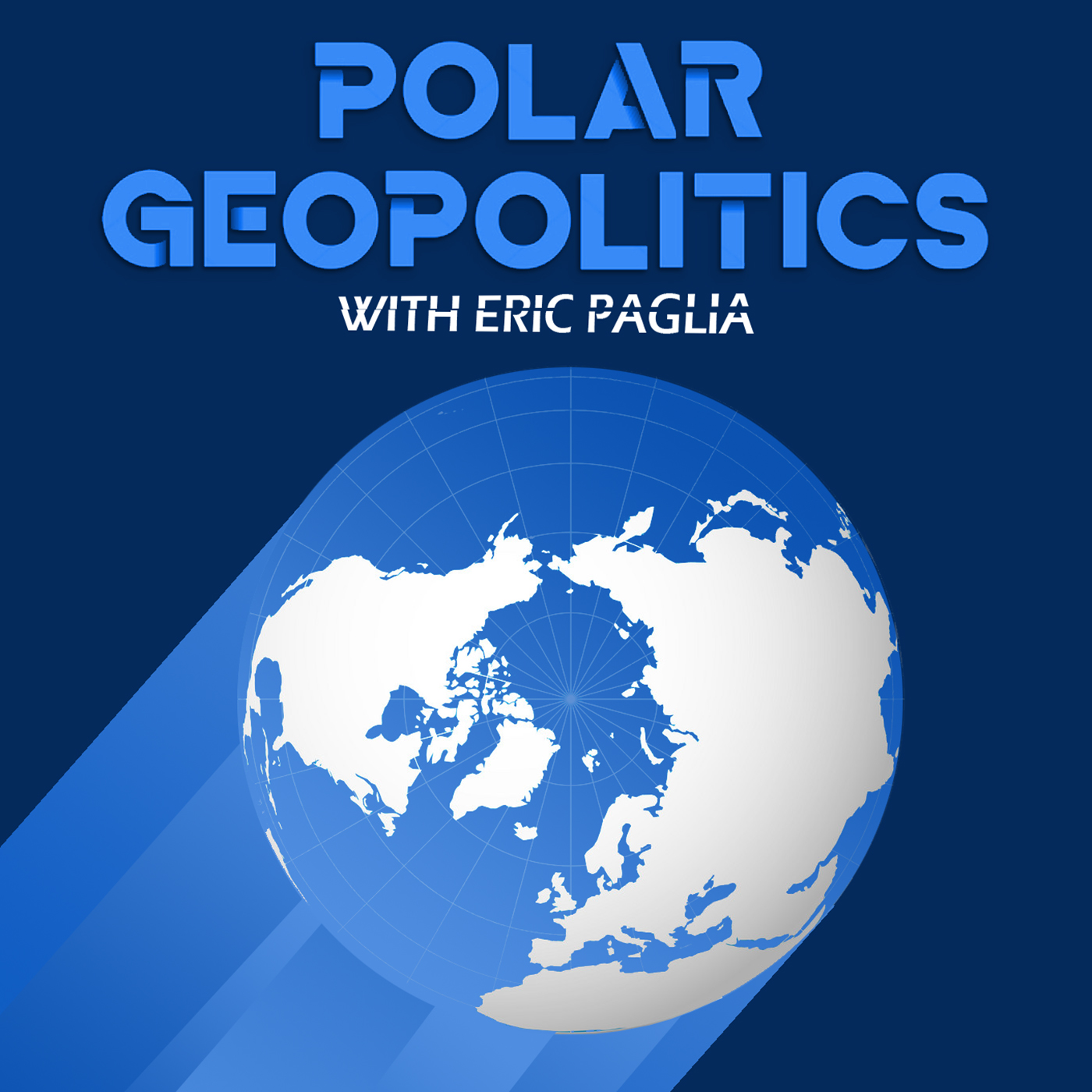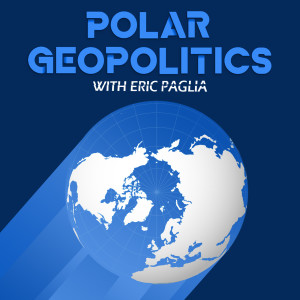
A podcast on the Arctic and Antarctica that applies the lens of geopolitics to analyze a wide range of critical issues pertaining to the polar regions and international affairs. In interviews with leading experts, recurring topics include Greenland, the Arctic Council, climate change, critical raw materials, the Antarctic Treaty System, hybrid warfare, science diplomacy, great power competition between the United States, China and Russia, sustainable development, Svalbard, NATO, Arctic shipping, Alaska, AI, technology and critical infrastructure, the Baltic Sea, military and national security, energy, the role of indigenous peoples in Arctic governance, and more. Polar Geopolitics is hosted by Dr. Eric Paglia, a podcast producer and environmental historian at KTH Royal Institute of Technology in Stockholm, Sweden.
A podcast on the Arctic and Antarctica that applies the lens of geopolitics to analyze a wide range of critical issues pertaining to the polar regions and international affairs. In interviews with leading experts, recurring topics include Greenland, the Arctic Council, climate change, critical raw materials, the Antarctic Treaty System, hybrid warfare, science diplomacy, great power competition between the United States, China and Russia, sustainable development, Svalbard, NATO, Arctic shipping, Alaska, AI, technology and critical infrastructure, the Baltic Sea, military and national security, energy, the role of indigenous peoples in Arctic governance, and more. Polar Geopolitics is hosted by Dr. Eric Paglia, a podcast producer and environmental historian at KTH Royal Institute of Technology in Stockholm, Sweden.
Episodes

Wednesday Feb 15, 2023
Wednesday Feb 15, 2023
Arctic megaconferences like the annual Arctic Frontiers in Tromsø and the Arctic Circle Assembly in Reykjavik have become critical meeting places that literally provide a world stage for the performance of Arctic governance and geopolitics. They have further served a particularly important purpose in the absence of official gatherings during the Arctic Council pause of the past year. Yet how much of what takes place, in public and private, actually influences developments and decision making in the Arctic? Do elaborate PR and public diplomacy activities that characterize conferences affect perceptions of Arctic stakeholders, and are certain voices privileged over others in such contexts? Beate Steinveg, associate professor at Nord University in Norway, has for many years conducted in-depth research on Arctic conferences. She joins the podcast to share her insights into the multifaceted importance of such events in shaping the governance of the region.
Please consider supporting the Polar Geopolitics podcast through PayPal or Patreon
Please rate and review Polar Geopolitics wherever you get your podcasts. You can follow Polar Geopolitics on Twitter @polargeopol. Website: http://www.polargeopolitics.com/

Thursday Dec 15, 2022
Thursday Dec 15, 2022
Despite the Covid crisis and Russia’s invasion of Ukraine, the Commission for the Conservation of Antarctic Marine Living Resources took certain steps forward on the management of key Southern Ocean fisheries during the recent Swedish CCAMLR chairmanship, which concluded in November at the organization’s annual meeting in Hobart. The creation of new Marine Protected Areas and other environmental protection measures have, however, continued to be blocked by some member states. Dr. Jakob Granit, Director General Swedish Agency for Marine and Water Management, joins the podcast to share his experiences and insights from two years as CCAMLR chair on managing the Antarctic marine environment, engaging with Russia inside the Antarctic Treaty System, and navigating the increasingly complex geopolitical dynamics of Antarctic governance.
Please consider supporting the Polar Geopolitics podcast through PayPal or Patreon

Friday Nov 25, 2022
Friday Nov 25, 2022
Although the Arctic Council has remained on pause since Russia’s invasion of Ukraine, multilateral interactions and diplomatic activity among senior Arctic officials (excluding representatives of Russia) has by no means come to a complete stop. Meanwhile, some stakeholders, particularly the Permanent Participant indigenous peoples’ organizations in the Arctic Council, see the current pause, even if well justified, as a relative loss of influence over Arctic governance. Finland’s SAO and Ambassador for Arctic Affairs Petteri Vuorimäki joins the podcast to provide insight into the current situation surrounding the Arctic Council, and to discuss Finland’s Arctic agenda as well as Arctic-Baltic security following Finland and Sweden’s NATO applications.

Wednesday Nov 02, 2022
Looking North for Renewables: Arctic solutions to Europe’s green transition
Wednesday Nov 02, 2022
Wednesday Nov 02, 2022
With energy and strategic raw materials increasingly at the center of geopolitics, the European Union’s first Arctic ambassador argues that Europe should look to certain areas of the Arctic in implementing its Green New Deal and transition towards renewables. Ambassador Marie-Anne Coninsx, senior associate fellow at the Egmont Institute in Brussels, joins the podcast to discuss a new Egmont report she co-authored with Karen van Loon, “Europe’s Energy and Resource Challenge: The Arctic is Part of the Solution”. She also makes the case for Belgium’s Arctic stakeholder status, while elaborating the country’s long-term engagement in the region.

Monday Sep 26, 2022
Monday Sep 26, 2022
In this moment of crisis, Prof. Oran Young shares insights accumulated across four decades, a time during which he laid the foundation for analyzing Arctic politics, and actively promoted governance initiatives in the circumpolar North. He also reflects on the legacy of Mikael Gorbachev, who was instrumental in establishing the idea of the Arctic as a “Zone of Peace”. This episode of the Polar Geopolitics podcast commemorates the 30th anniversary of Prof. Young’s seminal 1992 work, Arctic Politics: Conflict and Cooperation in the Circumpolar North, which largely launched the social scientific study of the Arctic region.

Wednesday May 04, 2022
Wednesday May 04, 2022
Facing the most serious crisis since its founding in 1996, the future of the Arctic Council—currently on pause due to Russia’s invasion of Ukraine—has become fraught with uncertainty. What role, if any, can Russia possibly play in polar governance institutions if and when the conflict it started eventually subsides? Evan T. Bloom, a Senior Fellow at the Wilson Center’s Polar Institute who was instrumental in the Council’s establishment and evolution during his long career as the top polar official at the U.S. State Department, joins the podcast to discuss Arctic and Antarctic governance in the aftermath of the war in Ukraine. Support the production of the Polar Geopolitics podcast through our PayPal or Patreon pages.

Saturday Apr 09, 2022
Arctic, Baltic and Beyond: Geopolitics, security and the spectre of a new Cold War
Saturday Apr 09, 2022
Saturday Apr 09, 2022
Arctic and Russia expert Caroline Kennedy-Pipe, Professor of War Studies at Loughborough University, joins the podcast for a wide-ranging discussion on the implications of Russia’s invasion of Ukraine on Arctic and Baltic security, Eurasian geopolitics and the liberal international order, as well as the threat of nuclear escalation and the possibility that great power competition between the United States, Russia and China could result in a new Cold War. Prof. Kennedy-Pipe also shares insights on the new UK Arctic military strategy and the lessons and legacies of the Falklands War forty years ago. Support for the Polar Geopolitics podcast can be provided via PayPal https://www.paypal.com/donate/?hosted_button_id=KXUVZKGALMFXU or Patreon https://www.patreon.com/polargeopolitics

Thursday Mar 17, 2022
Thursday Mar 17, 2022
Klaus Dodds, professor of geopolitics at Royal Holloway University of London and author of the recent book Border Wars: The Conflicts that will Define our Future, joins the podcast to discuss the impact of the Russian invasion of Ukraine on the Arctic Council and Antarctic Treaty System, on Baltic security and UNCLOS processes, and the ways in which the war has deeply disrupted the liberal international order, and potentially ushered in a new era of de-globalization.
